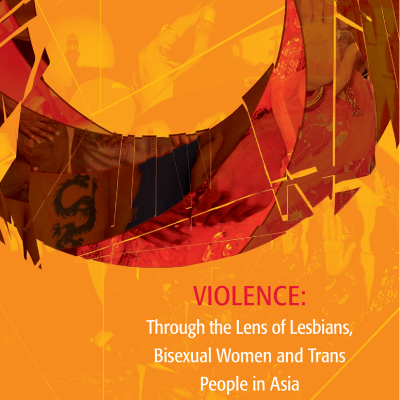Research
Collection and generation of resources is a part of our working area where we expand our knowledge and the voices of communities.
Resources > Research
This section is a comprehensive repository of research and reports produced by KRYSS Network. We aim to normalise the use of local lived realities as valuable evidence in our research endeavors, which will help us drive impactful advocacy for meaningful social change.
Some are done by our partner-directors when they were associated with other organisations, and where these resources are relevant to the work we do.
The Hidden Codes that Shape Our Expression: Understanding How Social Media Algorithms Obstruct Feminist Expression and How Malaysian Women Navigate the Challenges
Women’s visibility and expression on social media are often burdened by the risks of hate and harassment. The potential backlash and violence online have spurred women of all diversity to practice self-policing and censorship and to base their expression on the perceived reactions of their audiences. Several women in KRYSS Network’s earlier research have also expressed that the fear of disparagement and vitriol had led them to modify the way they expressed and spoke in digital spaces, knowing that they have very little to no control over their narratives once they become a target of online gender-based violence.
While online gender-based violence is rooted in gender-based discrimination that takes place in every facet of society, such forms of violence might be facilitated in particular ways by the algorithm and design of social media platforms. The design of social media is not neutral but is planned, prototyped, and developed to invite and shape participation toward particular ends, including what is not permitted and the policing of objectionable content and behavior. However, what is not permitted and the objectionable content and behavior that is policed, are not necessarily to promote and protect human rights. Algorithmic interference in freedom of expression can drive polarisation, reinforce existing disparities and discriminatory practices, and has a larger societal concern over manipulations of the distribution of information.
This research intends to better understand the barriers and biases resulting from algorithms in women’s access to freedom of opinion and expression, and to examine women’s resiliency and how they navigate these algorithms that are inherently limiting to create the much-needed space for women and gender non-conforming persons to speak out, to be heard, and to, in effect, occupy digital spaces.
Researcher: Serene Lim
Editor: Angela M. Kuga Thas
Design and Layout of Full Report: Chan Qian Hui
Design of Infographics: Chan Qian Hui
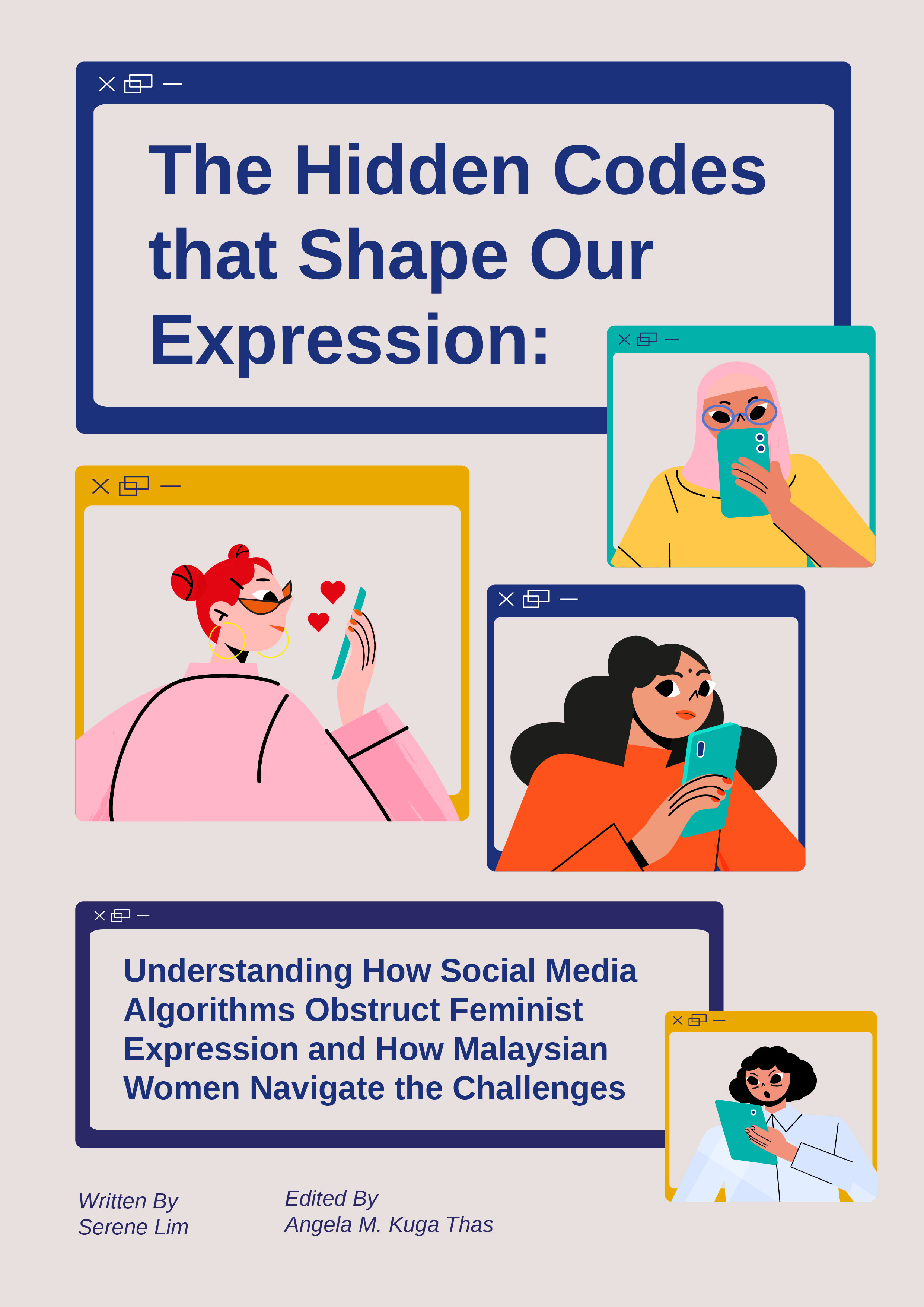
Power X Expression X Violence: A Research on Women’s Expression on Social Media in Malaysia
In 2019, we started on a research process to answer two dangerous assumptions, that:
- access to, and exercise of freedom of opinion and expression, is equal for all, and;
- social media platforms enable social and political freedom for everyone, women included.
Being neutral is not the same as enabling equality, given how, historically, the idea of being neutral in effect generically adopts the status and experience of cisgender heterosexual men and overlooks the experiences of other groups, i.e. differentiated by gender identity, sexual orientation, social class, etc. Any assumptions that presume everyone starts on an equal footing and has equal access to opportunity and power tend to deny rather than enable a diversity of voices.
Social media has significantly reduced the barriers to online public participation and expression in various forms. Today, we can easily engage with our Members of Parliament through X (formerly ‘Twitter’), or self-publish written articles at a relatively lower cost. Digital technologies open up spaces for women and queer people to challenge the dominant discourse of entrenched sexism, push forward their own narratives from their own voices.
This research, “Power X Expression X Violence: A Research on Women’s Expression on Social Media in Malaysia”, examines the power dynamics of various forms of expression and the intersecting identities of women; how our current understanding and practice of freedom of expression on social media has allowed online gender-based violence to grow with impunity and to the extent of normalising violence.
This research owes its deepest appreciation to the 23 women who had so generously and trustingly shared their lived experiences with us. It is their stories that led to the new insights on online gender-based violence and the feminists’ collective resistance against gender discriminatory norms in the digital spaces.
Read more about the research summary here:
We also had a social media campaign based on the findings of this research, which includes bite-sized infographics shared on our Facebook, Instagram and X and a one-and-a-half-hour online discussion on the topic, featuring panel speakers Dr. Rachel Gong from Khazanah Research Institute, digital activist Jac sm Kee and The Loud Asians. Read more about it here.
Researcher: Serene Lim
Editor: Angela M. Kuga Thas
Design and Layout of Full Report: Ezrena Marwan
Design and Layout of Research Summary: Jane Law
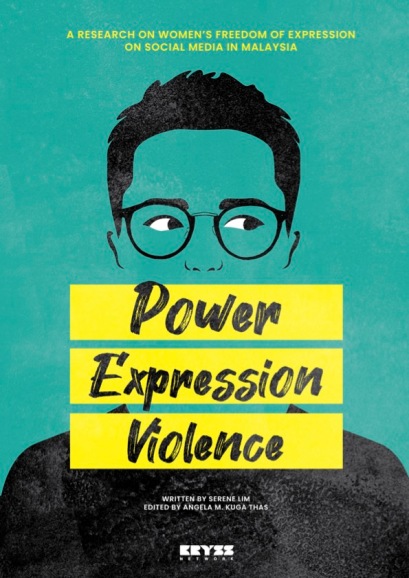
Voice, Visibility, and Variety of Viciousness: A Malaysian Study on Women’s Lived Realities on Social Media
This is the fourth study on internet rights by Persatuan Kesedaran Komuniti Selangor (EMPOWER) under the APC-IMPACT project. It builds on EMPOWER’s previous research on online freedom of expression and freedom of information as well as freedom of assembly and association. It is a feminist response to increased instances of bullying and harassment on social media, seeking a better understanding of how these forms of technology-related gender-based violence manifest in the Malaysian context.
The line between offline and online is greatly blurred. In fact, for many in Malaysia, it does not exist. As one respondent of this study said, “Being online is like a limb to me now. It’s so vital to my life.” But falling far behind this technological revolution is political recognition of the internet as a key means by which people can exercise and enjoy their human rights. Even though at least 78% of the country’s population is already connected, policy around access to the internet is still predominantly framed as economic infrastructure and opportunity. Issues such as political participation, human rights, and gender equality remain reticent.
Researcher: Juana Jaafar
Editors: Angela M. Kuga Thas, Serene Lim
Design and Layout: Ezrena Marwan
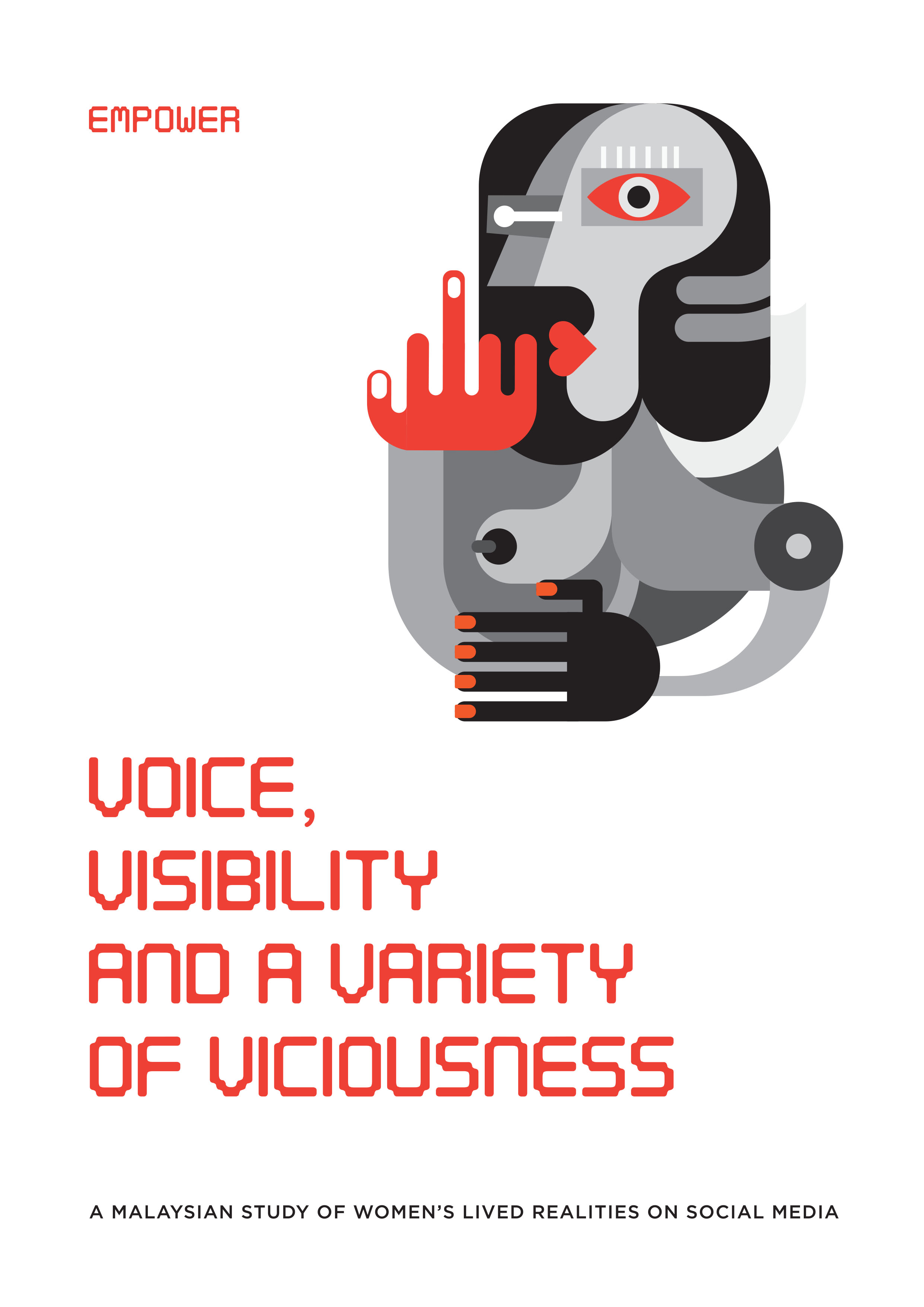
Voice, Visibility, and Influence: Towards Mapping Media Agents of Change for Gender Equality in Malaysia
“Women in media” has been interrogated through research in many ways. Conventionally, it touches on the portrayal of women, women’s roles and responsibilities, and the structural challenges faced by women journalists in media. As such, “voice”, “visibility” and “influence” of women can take many forms in media. However, little research can be found on how gender equality issues are portrayed in Malaysian media.
This research, therefore, pays special attention to women or men as media agents of change who have demonstrated through these three criteria that media can better reflect gender equality as a fundamental human right. In analysing the research data, and given the constraints of media and journalists in Malaysia, this research also started to ask what can be done and what could be possible in ensuring adequate and regular media coverage on gender issues, including a gender perspective on issues not typically considered gender issues.
Given the call for the establishment of a media council in Malaysia, mapping initiatives, agents of change, and specific mechanisms/platforms to mainstream gender in the media is critical as a reflective tool in strategising for the promotion of gender equality in Malaysia’s media. Emerging gender indicators have also shown it is imperative to include indicators, both qualitative and quantitative, which can help shape and bring about a critical gender consciousness and lens for people in media and in the write-up of issues.
This research was conducted by KRYSS Network, in collaboration with Institute of Journalists Malaysia, and with support from UNESCO.
In February, we disseminated parts of our findings through infographics on our social media. Click here to read more.
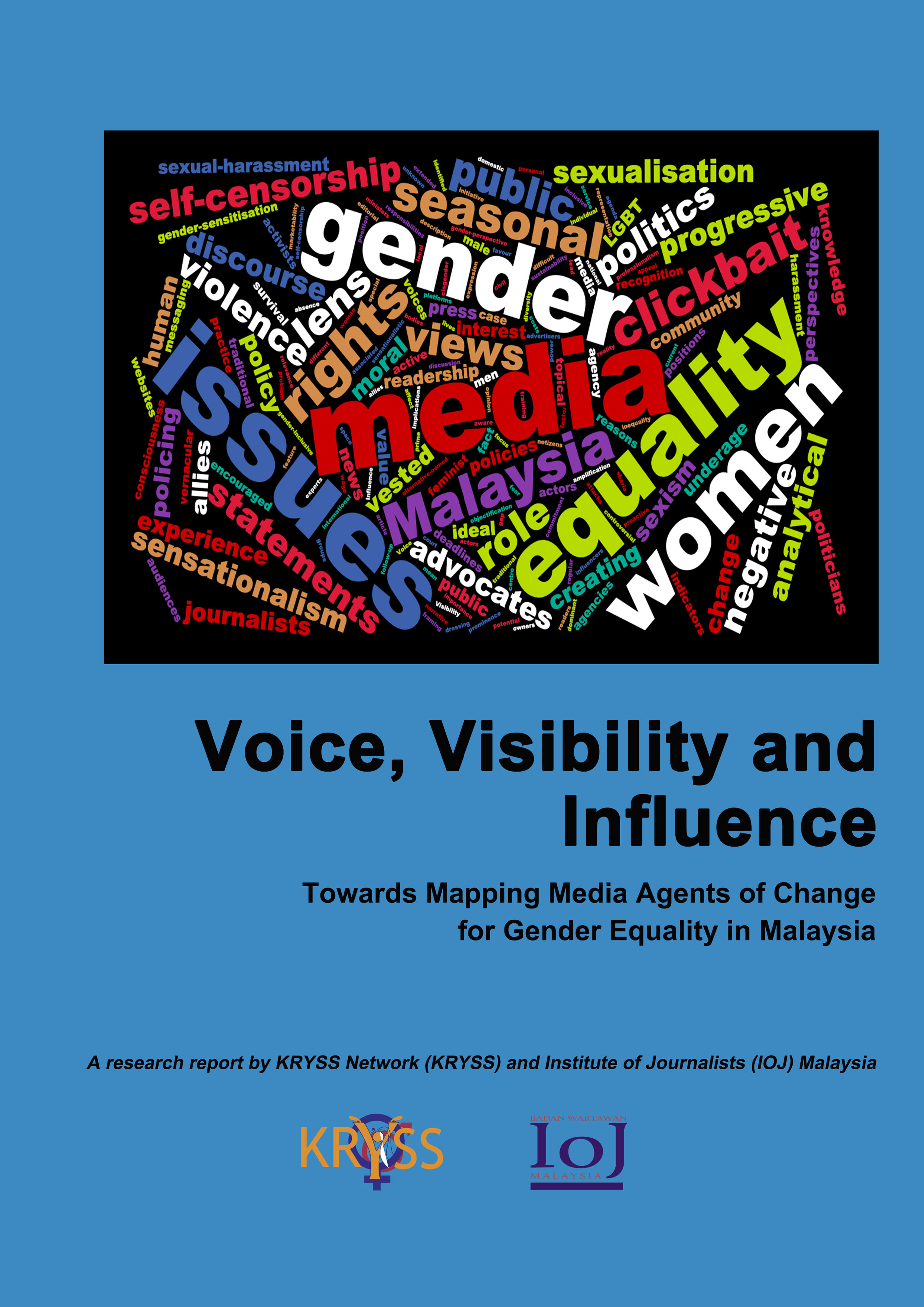
Extremism and The “Progressive” Extremist in Malaysia: Towards Understanding the Constructions of Masculinity and Femininity through the Collective and Its Ideology
This paper begins with an ideological analysis of “violent extremism” and “extremism”, and argues that to effectively prevent violent extremism, there is an urgent need to better understand and counter-extremism.
This paper makes a conscious distinction between “violent extremism” and “terrorism” and offers conceptual clarity on the definition of “extremism”, that is, as “actions, both violent and non-violent, that are informed by a supremacist ideology enforced through authoritarian, dictatorial or totalitarian traits, with the intention of achieving a purist and singular existence for a specific group while rejecting the concept of equality, particularly gender equality, and all forms of diversity and pluralism; and uses both communal and political space to advance their cause in efforts to take state power”.
The paper then surfaces the phenomenon of the “progressive” extremist and suggests that a conventional understanding of “progressive”, “masculinity” and “femininity” in analysing such phenomena must be revisited from the perspective of the supremacist ideology, that the paper argues, underpins extremism. This paper further posits that extremism in Malaysia is informed by a supremacist ideology and that the ideation of such extremism is premised on a group identity that stresses deindividuation.
This suggests that masculinity and femininity within extremism takes on a collective identity, and as such, the paper argues that it has to be analysed and understood from the collective’s perspective. For example, the act of questioning is associated with the troublesome, problematic woman. It is seen as a feminine trait that men in these circles exhibit if they were to question the “authorities” in such extremist groups.
The paper draws on both desk research and interviews with 16 research respondents to clarify the processes by which people become extremists, and how extremism links to violence and violent extremism.
This research was undertaken for UN Women, from November 2018 to March 2019.
For more information on the research, please write to info@kryss.network.
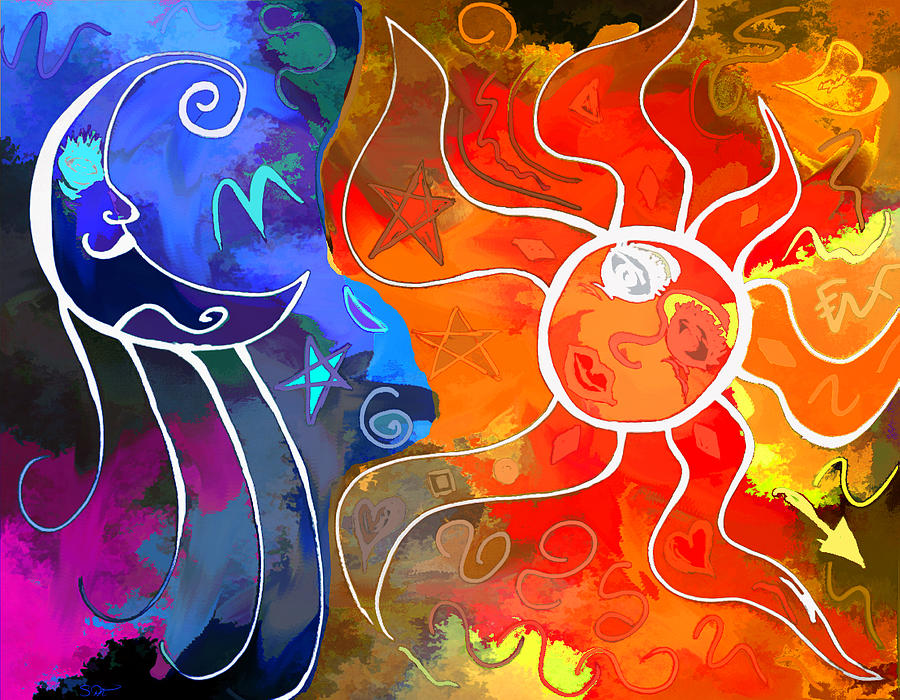
On the Record: Violence Against Lesbians, Bisexual Women and Transgender Persons In Malaysia
It was in 2010 that the CEDAW Committee adopted two ground-breaking General Recommendations that clearly elaborated the human rights protections afforded to lesbians, bisexual women, and transgender people under the UN Convention on the Elimination of All Forms of Discrimination Against Women (CEDAW). This included General Recommendation No.27, which recognised the multiple discriminations faced by older women. It was also the first time that transgender people (both transgender women and transgender men) were explicitly protected under the Convention and provided a credible framework for us who work on sexuality rights and the rights of the LGBTIQ to advance the necessary research for evidence-based advocacy in the Asian region.
“On the Record: Violence Against Lesbians, Bisexual Women and Transgender Persons in Malaysia” was one of these researches and it was done in collaboration with OutRight Action International. The research findings showed that LBT persons in Malaysia faced the most severe violence from families and people of the same ethnicity or religion.
The research findings also provided valuable input at the time to the reporting processes of two UN Conventions, CEDAW, and the CRC, as well as for the Universal Periodic Review of Malaysia.
Read the full report here.
Read the specific chapter on the rights of the LGBTQI people in Malaysia here.
